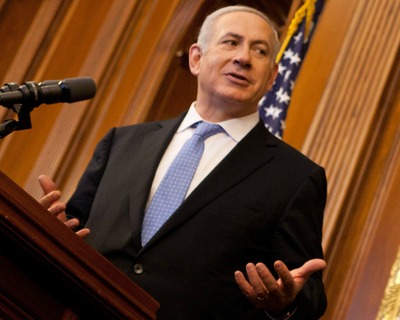The Israeli Prime Minister has sent a letter to his Turkish counterpart calling for a renewed state of positive relations between the two countries. It follows secretly held talks by the governments of Netanyahu and Erdogan to renew their strained relations, which sunk to an unprecedented low one year ago.
The restaurant is called ‘Istanbul,’ as indicated by the sign on its exterior. But it’s located in heart of central Tel Aviv. Essentially, it is Turkey’s biggest city exported to Israel. Inside at midday, locals pour in for a taste of Turkish kebab, Israeli-style. It’s kosher, so no yoghurt on the meat. But the grease dripping from the wrapped pieces of culinary heaven is just like the one 1,120 kilometers northwest.
But recent bad blood between the two countries has meant Istanbul (the restaurant) has fewer patrons, according to owner, Adi Mann.
“Less people came. There was an unpleasant feeling about it all. People even asked me to change the name of the restaurant. They didn’t want to identify with Turkish symbols. It reached a low point … but now we are seeing a slow return to how things used to be.”
And things may get even better, thanks to renewed efforts by both countries to revive their relations. First, revelations that representatives for the two governments were secretly meeting. And now, this week, the Israeli Prime Minister Binyamin Netanyahu sent a personal letter to the Turkish leader, Recep Tayyip Erdogan congratulating him on his victory, and appealing for a new way forward. In excerpts published by an English-language Turkish daily, Today’s Zaman, Netanyahu writes:
“My government will be happy to work with the new Turkish government on finding a resolution to all outstanding issues between our countries, in the hope of re-establishing our cooperation and renewing the spirit of friendship which has characterized the relations between our peoples for many generations.”
But Israel and Turkey have always endured a love-hate relationship. The Ottoman Empire, out of which modern Turkey arose, used to control the lands of pre-British Mandate Palestine. And Turkey was the first country with a Muslim majority to recognize the new Jewish state back in 1949. It was followed a year later by Iran – both Muslim, but non-Arab countries. Iran later cut ties following its 1979 revolution. Turkey never did. In fact, to this day, Israelis don’t need visas to travel to Turkey. Americans and even some Arabs – like those from the gulf Kingdom of Qatar – still do.
Israel and Turkey signed a free-trade agreement more than a decade ago. And trade levels have topped more than one billion dollars annually in each direction, numbers that have risen steadily over the course of Erdogan’s eight-year rule.

Experts, like Professor Ofra Bengio of Tel Aviv University, say military, strategic and diplomatic coordination between the two countries have always been considered by both to be a key priority, one strongly rooted for decades:
“Both Turkey and Israel are democracies, and we are trying to consolidate a region where there is so much instability around us, where (historically) there was a fear of the Soviet Union, where both of us feared the possibility that the Soviet Union would try to set foot here, in Israel and in Turkey.”
But a few years ago, a number of events – like a domino, one after another – began turning relations sour. First, Israel’s military offensive on Gaza in late 2006/early 2007, which left more than a thousand Palestinians dead, was widely criticized by the Turkish government and sparked protests across the country. Then, at the 2008 World Economic Forum, Erdogan stormed off a stage he was sharing with the Israeli president, Shimon Peres. The session was on Gaza, and Erdogan said Peres was getting too much speaking time. In 2010, a raid by Israeli commandos on a group of ships said to be containing aid headed for the blockaded Palestinian territory of Gaza left 8 Turkish nationals and one Turkish-American dead. The raid was strongly condemned by the Turkish government and by Erdogan himself, who called the act “state terrorism.” Ankara then symbolically recalled its ambassador from its embassy in Tel Aviv. And just a few months later, Israel encouraged its citizens – nearly 10% of whom who would annually visit nearby Turkey – to travel elsewhere for their holidays.
But there has been common ground, and now it appears Israel and Turkey’s differences are shadowed by a shared concern over regional unrest, according to Bengio.
“Israel lost its ally for long years, Egypt, in a way. It lost it because we are not planning on the same, let’s say goals, both Egypt and Israel. On the other hand, Turkey, too, is about to lose its friendship with Syria. So both of us, we feel now, this is the time to cement our relationship.”
It’s unclear if Netanyahu’s letter will be enough for the two to mend ways. It was mostly triggered by a recent announced that the Turkish vessel, the Mavi Marmara, on which the Turkish nationals were killed during the 2010 raid, would not be traveling as part of the new Gaza-bound flotilla. (The group funding the vessel, the IHH, denies the Turkish government’s involvement in the decision.) Still, Turkey says it is still awaiting a formal apology from Israel over the maritime raid. But for some, like those finishing their doner kebabs as Tel Aviv’s ‘Istanbul,’ when it comes to the two countries, it’s less about relations and more about recipes. As long as the food is this good, it almost doesn’t matter who is and isn’t talking.



